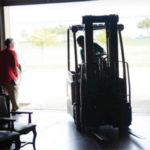Posted: 9/19/03
NEIL SPERRY:
Radio Gardener
Since 1978, gardeners in North Central Texas have gleaned their planting, weeding, spraying and harvesting information from the voice of Neil Sperry, first over WFAA radio and since 1980 over KRLD on Saturday and Sunday mornings. He also broadcasts daily statewide over the Texas State Radio Network and will be inducted into the Texas Radio Hall of Fame in October. His radio show, "Neil Sperry's Gardens Magazine," and a Texas gardening calendar have been judged the best communications of their kind by the Garden Writer's Association of America, and his book, "Neil Sperry's Complete Guide to Texas Gardening," has sold more than half a million copies.
A native Texan, Sperry attended Texas A&M University and has two degrees in horticulture from Ohio State University. He taught horticulture in high school two years and was a horticulture specialist with the Texas Agriculture Extension Service. He and his wife, Lynn, have three children. When he is not gardening, he is involved in a variety of hobbies, such as photography, painting Santa Clause figurines and making pens from historic woods of Texas. Proceeds from the sale of the pens go to the McKinney Education Foundation and Serenity High School. The Sperrys are members of the Lutheran Church.
 |
| Neil Sperry displays an assortment of the pens he has made from the historic woods of Texas. Among them are pens made from the Treaty Oak in Austin, a live oak at the Alamo and from a bat used by Rafael Palmeiro. |
Q.
You speak of your father often on your radio program. I know he was a major influence in your career choice, but was there an event or events that solidified the decision?
I have always wanted to be a horticulturist. It's inbred into me. I don't think it came from my dad, although being in botany he certainly nurtured it, and he was a very nurturing person, a very patient college professor. I just don't remember ever wanting to do anything else. In fact, I knew so early that in all those aptitude tests they put us through in school, I skewed them to the point that they said something like, “You've rated 108 percent on being outdoors.” It's a lifelong love.
Q.
Why did you choose your particular area of work?
I enjoyed landscaping, nurseries, going to nurseries. The first ones were Dyess Nursery in Bryan, Cornelius Nursery in Houston, Lambert's in Dallas. Mom and Dad would take me to Houston, and I would ask them to take me by Cornelius'. Sterling Cornelius has heard this story. He's one of my heroes. Wonderful man. That's all I've ever wanted to do.
When I started to A&M, I majored in horticulture. I worked in the floriculture department. I had a nursery all the way through high school. I was lucky enough to be student body president during my senior year, and we had major planting campaigns on the campus, and the community center in College Station was my school. Those are my trees out front, up and down what was Jersey Street. I planted live oaks up and down that road. It is now George Bush Boulevard on the way to the presidential boulevard. That's kind of fun to look back on that.
Q.
What is the greatest challenge facing Texas gardeners?
There is no question it is the climate. It is a foreboding climate. So many Texans are transplants, and wherever they are from, the climate was easier where they came from than it is here. It is a relearning thing. When people come to Texas, they have to put away their old plants, their old tools and their old techniques.
Timing is so different. It is different in Texas from Amarillo to the Rio Grande Valley. I do a statewide radio program, and it's tough to tell people in the spring that it's time to plant peas when I may be off by three months in another part of the state.
Q.
What is the most frequently asked question you receive?
How often should I water a given plant? Coincidentally, it is the question to which I somewhat apologetically say, “I don't have an answer.” It depends on temperature, soil type, vigor of growth. If a plant is dormant, it won't need as much water as it would at the same temperature in the growing season. That's a hard one to answer, but it's by far the most common.
Thirty-two percent of the calls I get are turf or lawn driven. I have taken more than 200,000 calls over the 25 years I have done that six hours a weekend, and part of it I have done eight hours. That's a lot of calls, and there is some repetition. Out of the 32 percent, by far the most common is how they should get rid of a weed, Dallas grass, clover or nut sedge, dandelions, etc.
Q.
You exhibit an amazing amount of patience in dealing with your callers. Is that something that comes naturally, or have you had to work at it?
I am not patient, as I always tell people. But apparently the facade is out there that I am patient. I also always tell people I have an off button for the microphone. But I am more patient with callers than I am with myself. I know there are areas I don't understand very well, such as car repair. I am the guy who called the gas company to get help in lighting the pilot light on my water heater when I couldn't get it going and then had the service man tell me: “Mr. Sperry, you have an all-electric home. This is a fuse problem.” I have learned to be patient accordingly.
Q.
Do people stop you on the street to ask you about gardening questions?
Everywhere. I am flattered by that, lucky to have that opportunity. I chose radio but also do a lot of TV, and I can tell the difference if I have been on TV recently and go into a garden center, because I get recognized. What I have always told myself is radio is just fine for me. First of all, I have a face for radio, and I can always be quiet when I go out in public; I can't be invisible.
Q.
How did your pen making get started?
Pen making got started as a give-back for the help our family received. We have a child in recovery now eight years from cocaine addiction at age 16. We are deeply indebted to the organization that identified our child's problem in 20 minutes that psychiatric counseling and even pastoral counseling had not done in two years.
I think if I had one message to give parents, it is how little control we have over children. By my nature, I am somewhat controlling, and I thought I could protect my family from that. We moved to the country to get out of the city life, and the drugs came right here with us. I was so beholden to that organization for helping us, and they were in dire straits, and so I started making pens and giving them the proceeds from the sales.
I love to make and paint Santas and had thought of using them as Santas for Sobriety, but in two hours I sold all I had made in five years. The pen making became a more expedient way of doing it. They have been a real blessing. I have sold a lot of them.
Q.
You often refer to Serenity High School in McKinney and your passion for it. How did that develop, and what is your involvement with the school?
Serenity High was started in 1999. In 1995, after our child was diagnosed as addicted to cocaine, in only a few days we were at a wonderful rehabilitation center called Hazelden in Plymouth, Minn. While we were in Minnesota with our child, we were made familiar with a school, Sobriety High School, in Edina, Minn. Sobriety is private; Serenity High is public, a part of the McKinney school system.
My wife has been on the school board here in McKinney for 20 years and is on the Texas Association of School Boards board of directors, and it was our goal as Serenity got started that it would be a model school. That is beginning to happen, and it is our hope that it will be reinvented in other districts and other cities.
It is so neat to see young men and women who have been to rehab–that is the requirement at Serenity–and be successful there. Serenity High was named by young people in recovery, and the name won by one vote over “Not High School.” It is a very special opportunity.
The most common thing you hear at the two graduations held each year is, “I never thought I would see this day.” It is really an emotional graduation ceremony. Finding out our child at 16 was a cocaine addict was the best thing that ever happened to our family, from the standpoint of bringing us together and bringing me to my knees in humility and thanks to God for the blessings we have been given and the strength to move on to another day. I wouldn't trade where we are for anything.
Q.
How important is religious faith in your life?
Religious faith is very important to me. I find the serenity prayer to be monumentally important: “God, grant me the serenity to accept the things I cannot change, courage to change the things I can and wisdom to know the difference.” I don't read very well, and so I don't sit and read the Bible. I don't read anything. I have dyslexia and didn't find it out until five years ago. I wondered why I had so much trouble proofreading.
So, from that standpoint I wouldn't want to be set up as someone who is in church every Sunday. I am on the radio every Sunday. People know right where I am. But I pray to say, “Thank you.” I pray to ask for advice, not favors, and I am very conscious of God's presence in my world. There are many things that have happened to me as a father and husband, and I think they have been focused in these last eight years even more. In my 12-step group, there are things called “God things,” and they could not have happened any other way.
Q.
Aside from your pens, do you have other hobbies?
Yes, I am addicted to hobbies. I did a story once about the collections of a life. As a child, I had matchbook covers from my dad's travels. I had an arrowhead collection and learned to hunt and make arrowheads. I had a rock collection and then began collecting woods. My garage is full of woods that predate the pen making. Then there were Santas and chocolate molds. I am making shore birds now. Gardening is the same way; I have collections of day lilies and haworthias or other plants. I am at peace with it. My wife just looks the other way and dismisses it as Neil's latest fetish.
Interview by Toby Druin













We seek to connect God’s story and God’s people around the world. To learn more about God’s story, click here.
Send comments and feedback to Eric Black, our editor. For comments to be published, please specify “letter to the editor.” Maximum length for publication is 300 words.